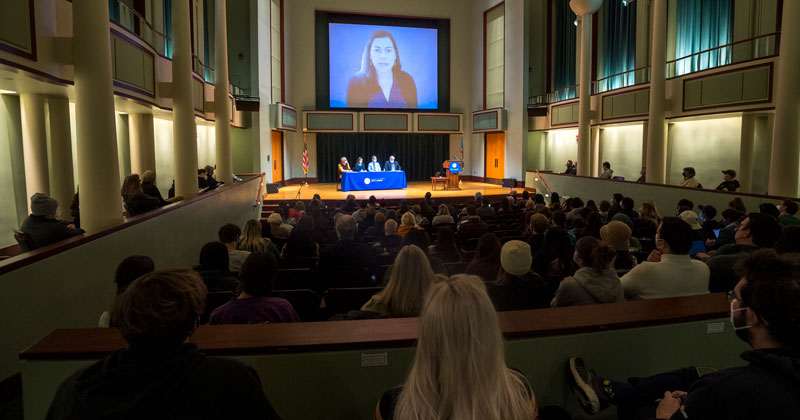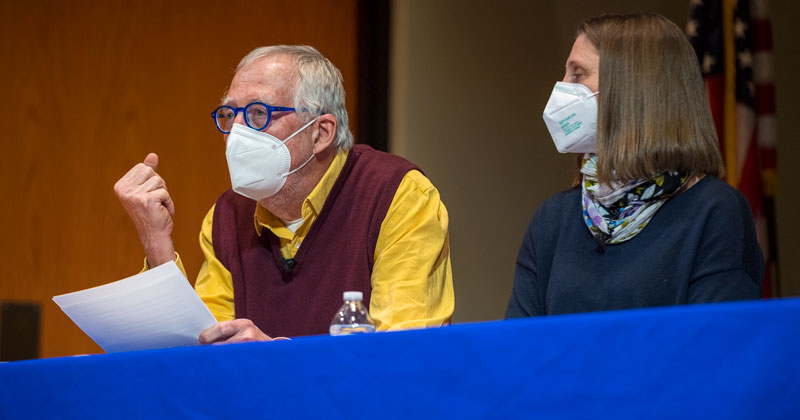


UD scholars lead panel discussion on Ukraine
Photos by Kathy F. Atkinson March 02, 2022
Event draws 500 in person and online
“We are in a new Cold War,” said Stuart Kaufman, a professor in the University of Delaware Department of Political Science and International Relations, speaking about the impact of the Russian invasion of Ukraine.
Kaufman joined three other UD scholars for a panel discussion, “Understanding the War in Ukraine,” held Feb. 28 in Gore Recital Hall and streamed online.
More than 500 people attended the interdisciplinary event, which was sponsored by the College of Arts and Sciences. Other scholars joining the discussion were Holly Myers, an assistant professor of Russian in the Department of Languages, Literatures and Cultures; David Shearer, Thomas Muncy Keith Professor of History in the Department of History; and Polly Zavadivker, an assistant professor in the Department of History and the Jewish Studies Program.
The political, historical, cultural, economic and linguistic context of the invasion was explored, as well as why diplomacy failed, and predictions as to what might come next.
Kaufman, who worked in foreign affairs for the Clinton administration, delved into what Russian president Vladimir Putin was thinking when he ordered this invasion, outlining three possible motivations in plain-spoken terms: theory #1 -- Putin is a rational actor responding to threat; theory #2 –- Putin is a thug; theory #3 -- Putin is crazy.
As to the first theory, “Russians feel like they are slowly being surrounded,” said Kaufman, referencing the NATO expansion eastward. Putin had made it clear that if such expansion continued it would be met with resistance. In characterizing Putin as a thug, Kaufman noted that when threats and intimidations don’t work, thugs turn to violence. Although Putin has often been seen as the cold, calculating former KGB agent, Kaufman said that Putin’s angry and rambling hour-long speech on Feb. 21 illustrated how much Putin views himself as the “Russian leader who will restore greatness.” He has become increasingly isolated physically and psychologically during the pandemic and thus his “delusions of grandeur” have probably only been heightened.
Regardless of what brought Putin to this point, Kaufman now sees “no way out of this except through it,” and predicts mass casualties and millions of refugees in the weeks and months ahead.

Myers spoke about the cultural interconnectedness of Ukraine and Russia, although she was quick to note that this very bond undermines Putin’s attempt to use it as an excuse for aggression. She noted that every Russian schoolchild studies The Tale of Bygone Years (often known in English as The Primary Chronicle) and that this 12th century historical account is used to portray Kyiv as the cultural and spiritual home of Russians. In fact, its opening words speak of “the origin of the land of Rus, the first princes of Kyiv and how the Russian land came to be.” Since the war began, she pointed out, there has been a state-controlled media blackout on the Russian bombing of Kyiv.
Like Kaufman, Shearer found Putin’s Feb. 21 speech remarkable. “Putin positioned himself as a defender of the Russian population in Ukraine who are supposedly suppressed. And there is a kernel of truth in that assertion,” acknowledged Shearer. “Putin had played a weak hand rather deftly up until his speech last Monday night,” he said.
In that speech, Putin claimed that the very existence of Ukraine was artificial and only a result of the collapse of the U.S.S.R. But Shearer pointed out that it was the Ukrainian War of Independence from 1917 to 1921 that resulted in the establishment and development of a Ukrainian republic, not the 1991 dissolution of the U.S.S.R.
Zavadivker, who joined the event via a video feed, presented a personal perspective on the war in Ukraine, noting that she was the first in her family born in the U.S. and that she still has many family members in Ukraine, some of whom she has been speaking to on a daily basis since the invasion. She finds it incomprehensible that Putin claims he is attempting to “denazify” Ukraine. She said that Putin’s attempt to portray Ukraine’s government as fascist has been denounced widely, including from Ukrainian President Volodymyr Zelensky, who is Jewish and had family members die in the Holocaust.
The panel discussion featured time for Q&A, including a question from junior European Studies major James Cottle-Vinson, who asked if Putin could do this in another country. Kaufman responded that Estonia or Latvia could be Putin’s next targets but noted that the Russian leader will be “bogged down” for the foreseeable future. “There is a significant difference between Putin’s aspirations and capabilities, he said.
Political science doctoral student Claus Soong asked a similar question, wondering if China will now be emboldened to take aggressive actions against Taiwan. Soong is Taiwanese and began his studies at UD this past August. While noting that there are important differences between the two situations, Kaufman said he believes China is watching the war in the Ukraine very carefully.
Several more events are planned, including a March 8 panel discussion, “World Disrupted: Ukraine and Global Order,” featuring faculty members from the Department of Political Science and International Relations. Check the Events site for more details on this and other upcoming programs.
Panel on "Understanding the War in Ukraine": youtube.com/watch?v=o0nrwzxdCH8
Contact Us
Have a UDaily story idea?
Contact us at ocm@udel.edu
Members of the press
Contact us at 302-831-NEWS or visit the Media Relations website

